I'm sorry to say that after the mountains, the first thing I noticed when I saw La Ceiba six years ago was the trash, the next thing was the electrical wiring, but that is another story. There is trash everywhere − it is even worse out in the country than it is in the towns. It is hard to find a tourist travelogue that doesn't mention how dirty La Ceiba is, even those tourists who have traveled to other Central American countries comment on it. Having grown up learning what a sin it is to litter, I couldn't help but be shocked by what I saw.
My first trip to La Ceiba was in a taxi from the airport after dark. All along the edges of the highway, there were burning piles of trash. I was scared! I thought it was some sort of protest and that I had come to a war zone for vacation!
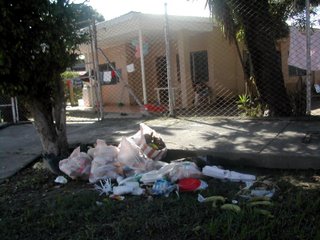 In fairness to many Honduran people, trash pickup service, trash cans, and recycling bins are scarce to non-existent. Some people just can't afford to pay for pickup service even if it is available, which it mostly isn't outside of the larger towns.
In fairness to many Honduran people, trash pickup service, trash cans, and recycling bins are scarce to non-existent. Some people just can't afford to pay for pickup service even if it is available, which it mostly isn't outside of the larger towns.In La Ceiba and San Pedro Sula, the trash collectors are the first to go unpaid when the municipalidades (city governments) run out of money − so of course they stop picking up the trash. Why would they when they aren't being paid? People have to pay a fee to take trash to the La Ceiba city dump, so many of them just dump their trash on an out of the way street or empty lot, even in the nicer neighborhoods.
Once I was on our upstairs terraza and I saw our new maid carrying a bag of trash from the house out towards the hill in our backyard. I yelled, "Nooooo!" but it was too late as I saw her fling the bag towards the creek into the lower level of our own backyard!
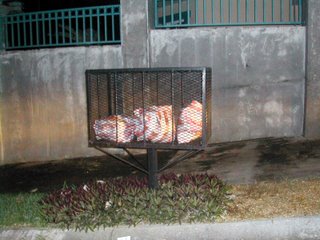 I've read that in many places in Mexico, you have to be outside to personally hand your trash bag to the collectors. While inconvenient for the residents, I'm sure it does a lot to prevent litter. Here in La Ceiba, many homes have these types of trash receptacles which help to prevent the starving dogs from making a mess of the trash but don't do much to prevent cats, rats, or birds or the starving people who tear open the trash bags looking for something to eat.
I've read that in many places in Mexico, you have to be outside to personally hand your trash bag to the collectors. While inconvenient for the residents, I'm sure it does a lot to prevent litter. Here in La Ceiba, many homes have these types of trash receptacles which help to prevent the starving dogs from making a mess of the trash but don't do much to prevent cats, rats, or birds or the starving people who tear open the trash bags looking for something to eat.Out in the country there is generally no pickup service at all, so people dump their trash wherever it's convenient, maybe a town dump, maybe the street, maybe the river, or maybe just in their backyard where they burn it. The smell of burning plastic can be overwhelming in some colonias. I've read that burning plastic can cause permanent brain damage, especially to children.
 As a former recycling advocate in Dallas, when I first moved here I just cringed every time I threw a plastic bottle or metal can in the trash, but there didn't seem to be anything else to do. A year ago I read in the paper about a plastic recycling company in a nearby town, so I immediately started rinsing and saving all of our plastic refuse.
As a former recycling advocate in Dallas, when I first moved here I just cringed every time I threw a plastic bottle or metal can in the trash, but there didn't seem to be anything else to do. A year ago I read in the paper about a plastic recycling company in a nearby town, so I immediately started rinsing and saving all of our plastic refuse.We never were able to find this company, but we've since learned that the trash collectors, as a side line business to make extra money, go through all the trash and pull out the recyclables to sell. Apparently they know where to take the things. I imagine that they are thrilled to find my nicely rinsed, separately bagged plastic and cans. I hope they can make a few lempiras from it.
 It is a custom for passengers to eat and drink on buses. Buses have signs saying "Don't leave your trash on the bus" but almost never provide any kind of trash receptacle because they would have to pay a couple of lempiras for a bag. As a result, the trash is thrown out the windows and litter lines every street and highway wherever you go in Honduras.
It is a custom for passengers to eat and drink on buses. Buses have signs saying "Don't leave your trash on the bus" but almost never provide any kind of trash receptacle because they would have to pay a couple of lempiras for a bag. As a result, the trash is thrown out the windows and litter lines every street and highway wherever you go in Honduras.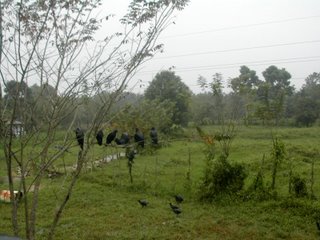 Ninety percent of the litter is plastic so it isn't going away. Luckily, Honduras has a huge population of vultures in the country and pigeons in the cities, so that takes care of the food and dead animal waste or this would probably be a country with a cholera or plague epidemic.
Ninety percent of the litter is plastic so it isn't going away. Luckily, Honduras has a huge population of vultures in the country and pigeons in the cities, so that takes care of the food and dead animal waste or this would probably be a country with a cholera or plague epidemic.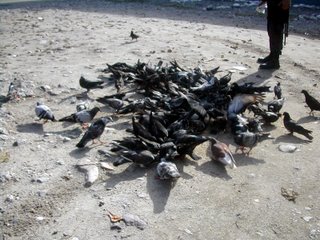 La Ceiba has a Gran Carnaval every year in May. It's one of the only times of year that the nicer hotels fill up with tourists. There is a big afternoon parade with decorated floats, several street bands in the evening, and lots of people selling food and other junk in the streets for a week or two before and a few days after the carnival.
La Ceiba has a Gran Carnaval every year in May. It's one of the only times of year that the nicer hotels fill up with tourists. There is a big afternoon parade with decorated floats, several street bands in the evening, and lots of people selling food and other junk in the streets for a week or two before and a few days after the carnival.In honor of the occasion, a day or so before the parade, the municipalidad (city government) hauls out a hundred or so 55-gallon trash barrels and places them along Avenida San Isidro, the main street. These barrels are in no way sufficient for the amount of trash accumulated by the thousands of people eating and drinking in the streets all day and all night long. The cans fill up by 7 p.m. or earlier and the rest of the trash and excess food is discarded in las calles (the streets). When I go to carnaval, I usually want to throw away my shoes when I get home.
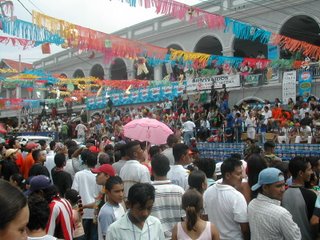 Actually, it is mostly the tourists who use the trash cans. Ceibeños are notorious for throwing their basura (trash) in the streets, carnival or no. Occasionally the schools make their students go out on Saturdays to pick up trash as a community service. Even the municipalidad sometimes will force the city employees to do a clean up campaign. The effects last maybe a day or two.
Actually, it is mostly the tourists who use the trash cans. Ceibeños are notorious for throwing their basura (trash) in the streets, carnival or no. Occasionally the schools make their students go out on Saturdays to pick up trash as a community service. Even the municipalidad sometimes will force the city employees to do a clean up campaign. The effects last maybe a day or two.The city of La Ceiba is prone to frequent and severe flooding, a direct result of the sewer system being filled with plastic soft drink bottles and plastic bags. Even an hour of tropical rains can cause many of the streets to flood. City spokesmen always tell the media that the "flooding is caused by ignorant people who stop up the drainage lines with trash."
Despite the city's interest in these litter campaigns, as soon as Carnaval is over, the basureros (trash cans) are picked up and taken to − I don't know − a trash can storage vault? This is done so that the cans will be tucked away safely until next year and the next carnaval. The very few business that do maintain a trash can outside their establishments generally have them secured to a light post with a heavy-duty chain. People steal them if they are left out.
I have walked blocks around town with a can or plastic bottle in my hand looking for a trash can. I have had the experience many times of going into a store to shop or a restaurant to eat and asking if they had a trash can where I could dispose of it and having them tell me "no!" So, is it any wonder that people throw their trash on the street?
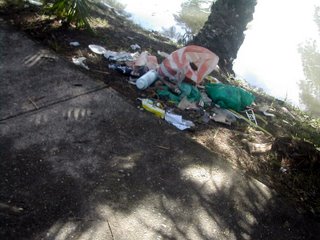 In all fairness, what would you do with your mountains of trash day after day, year after year, if it wasn't being picked up and you didn't have a car to take it somewhere? Like most of the problems in Honduras, I place the blame on the government and the lack of education. Sanitation service is something that should be provided by government. In fact, the sanitation charge is 31% of our total property tax bill.
In all fairness, what would you do with your mountains of trash day after day, year after year, if it wasn't being picked up and you didn't have a car to take it somewhere? Like most of the problems in Honduras, I place the blame on the government and the lack of education. Sanitation service is something that should be provided by government. In fact, the sanitation charge is 31% of our total property tax bill. I have lots of ideas, like recycling, teaching composting, requiring buses to carry a trash bag (but allowing them to take the bags to the dump for free), and what I think is a really great idea about those precious city trash cans. But I know no one would listen to a gringa. The standard answer for any suggestion (for improvement, not Americanization) is, "Well, this is Honduras. This is the way we do things," or "We don't have money for that."
My idea about the trash cans is this: Get local businesses (certainly hotels and restaurants have a vested interest in improving the appearance of the city) and the "elite" to donate trash cans and paint or use some of that 4% tourist tax. Take the old and new cans and paint to the local schools and have the kids decorate them. Have a contest with prizes for the kids and/or schools with the best trash cans. Have an show displaying the artwork and then display them proudly on every street corner in El Centro. Simultaneously, have a real litter/civic pride campaign, something like "Make Ceiba beautiful." It seems to me that highly decorated trash cans would not be so likely to be stolen since it would be so obvious where they came from. And the novelty of a brightly painted can just might cause more people to use them.
I thought it was a brilliant idea, but since this is Honduras, most people would be hesitant to donate because probably whoever was in charge of the program would steal the money and paint.
There is hope for a change in this country, because children are now learning in schools about the damage done by litter and about recycling. But it is going to be a long, uphill battle to change the culture of "it's not my problem" or "everyone does it so what difference will it make if I don't."

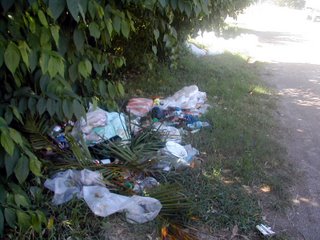

 Welcome to my Blogicito —
Welcome to my Blogicito — 







